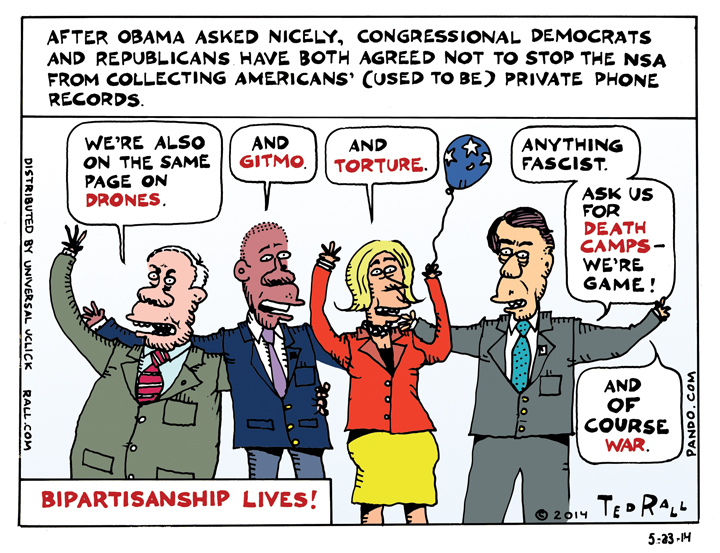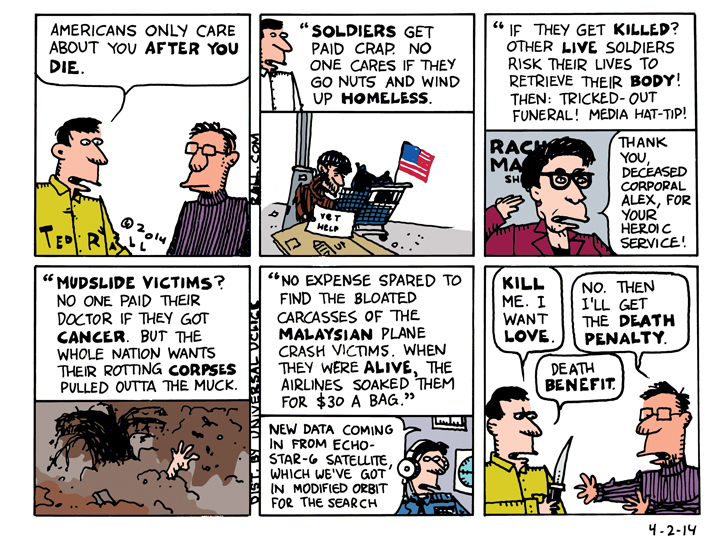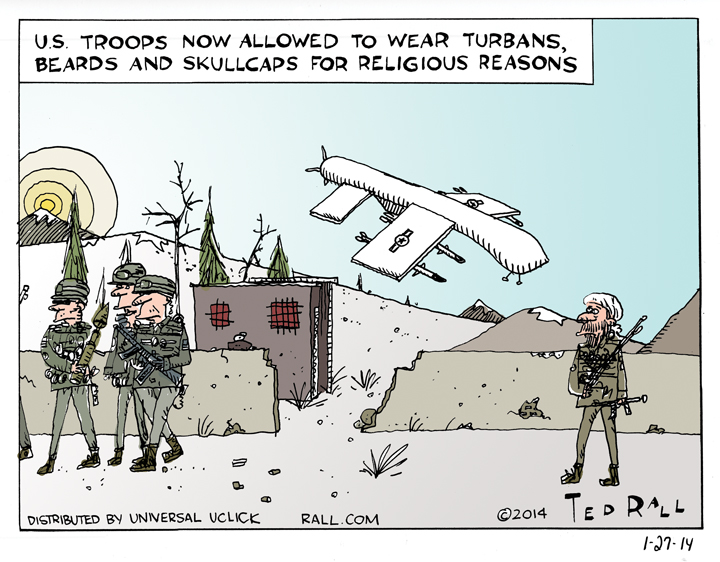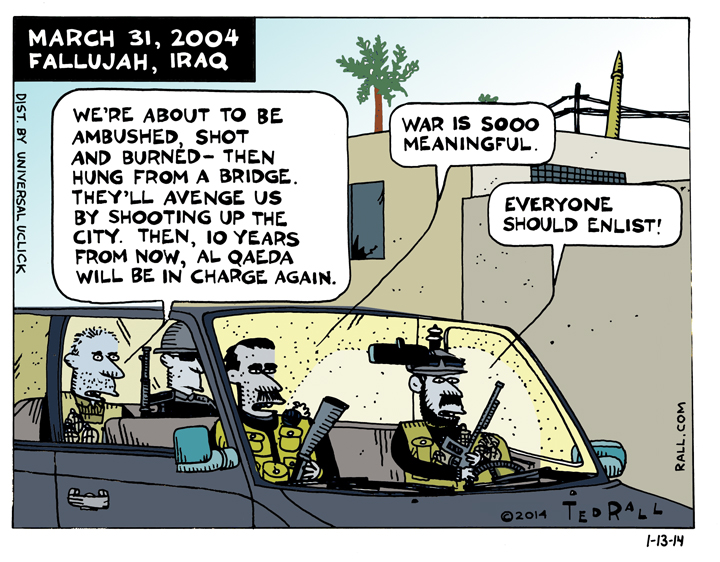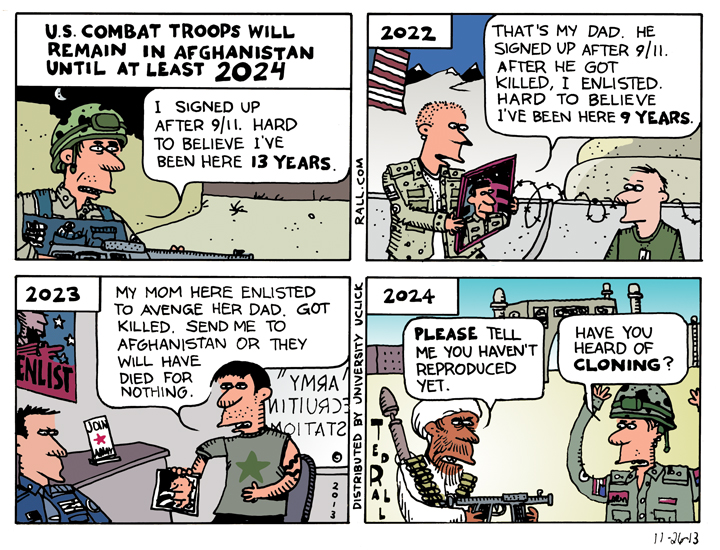
They can’t help themselves.
Whatever the situation, the reaction of U.S. policymakers is more war.
Weak economy? War will get things going. Strong economy? Military spending will cool it off.
Two wars in the Middle East (Afghanistan and Iraq) finally winding down (because we’ve lost and people are sick of them)? Time to ramp up secret arms sales to a pair of pipsqueak insurgencies (Libya and Syria).
Other superpowers love militarism. But only the United States would send troops, rather than aid workers, to people devastated by natural disasters like tsunamis and earthquakes…even within the United States.
As Joel Andreas put it in his seminal graphic novel-format comic, American politicians are addicted to war. And we — even those who identify with the antiwar left — are like an addict’s long-suffering spouse, trapped in a dysfunctional relationship where we enable the militarism we claim to deplore.
The ruling elite’s addiction to militarism is fully visible in President Obama’s announcement that he plans to re-invade Iraq. He’s starting small, with a few hundred military advisers and maybe (i.e., probably) airstrikes via the precise, never-fails, cares-so-much-about civilians technology of drones. Sending a few hundred military advisers was, of course, how JFK initiated America’s involvement in the Vietnam War.
But we’ve already been through all that in Iraq. We invaded. We propped up a wildly unpopular pro-U.S. puppet regime. We fought. We lost — and lost big. We withdrew. Now our pet autocracy is collapsing. In Vietnam time, it’s 1975 in Iraq. This is supposed to be the part where we burn stacks of $100 bills, push Hueys into the sea, shove desperate locals off the roof of the embassy in Saigon/Baghdad and get out. Twenty or so years later, we come back and invade the right way — as obnoxious tourists and predatory sneaker company executives.
What’s up with Obama? Why is he treating Iraq like it’s Vietnam in 1962 — as though this were one of those hey, let’s just send a little help and see what happens affairs, as in there’s no way, no how “combat troops” (as opposed to non-combat troops) are going in (again), unless they do?
Even by presidential standards, Obama’s behavior is bizarre. Somewhere in the multiverse there must be one version of this story in which a half-dozen cabinet members, steeled in their resolve by the support of the Secret Service, rush into the Oval Office and bundle the President off to an institution that can give him the treatment he seems to require.
Alas, we live here.
In this weirdass country, the President’s re-invasion of Iraq is supported by 320 million enablers — not least of whom is the media.
It’s not just the sickening worship of all things soldierly, as when so-called journalists say “thank you for your service” to armchair generals who will never be on the wrong end of a shot fired in anger. The media drowns us in so much misinformation that it’s impossible for all but the most dedicated between-the-lines readers to come to an intelligent assessment of the facts.
Consider, for example, The New York Times. Given how often the paper has gotten burned by its pro-militarist establishmentarianism (supporting the failed right-wing coup attempt against Hugo Chávez in Venezuela, supporting the 2003 invasion of Iraq, not returning Edward Snowden’s phone call), you’d think its editors would be reluctant to support Gulf War III.
And yet.
A June 17th piece bearing the headline “Your Iraq Questions, Answered,” in which Times reporters reply to readers, is illustrative.
One reader asks: “ISIS [the Islamic State of Iraq and Syria, the Islamist insurgent militia threatening the U.S. puppet regime of Nouri al-Maliki, currently in control of half the country] seems to have legit online following. Is this reflective of support on the ground?”
Rod Nordland, Kabul bureau chief but reporting from Iraq, replies: “ISIS has a huge and very aggressive social media operation, but I don’t know how anyone could characterize that as a legitimate following. I suspect a lot of their followers, clicks and retweets are voyeuristic because the material posted is so bloody and savage, and ISIS is completely unapologetic about it. Hopefully, most of their following is aghast.”
So much for any smidge of journalistic objectivity.
Then things turn really stupid:
“Most people in the territory ISIS controls do not seem terribly supportive of them, but they hate the Shiite-dominated Iraqi government far more, and ISIS takes pains to treat the Sunnis in their dominions with consideration — at least at first. That is the central challenge that the Iraqi government faces, to convince people in ISIS-dominated areas that their government wants to include them, and has more to offer than the ISIS extremists.”
Anyone who has studied history or read Che Guevara — which you’d hope an employee of The New York Times might have done — knows that ISIS, as a guerilla army outgunned and outmanned by the central government it seeks to overthrow, would never have gotten as far as it has without substantial support among civilians.
Even more egregious than Nordland’s failure to convey this truism to Times readers is his closing combination of childlike naiveté and taking sides. Maliki has been in office for eight years. If he were interested in building a pluralistic post-sectarian political coalition, rather than ruthlessly excluding all but his own Shiites from positions of influence, he would have done so by now. Even with ISIS on the road toward Baghdad, he hasn’t shifted his Shiite-centric approach.
With the most respected news source in the United States spoon-feeding such nonsense, it’s no wonder we can’t break free of the militarist traps laid for Pentagon generals by defense contractors, for the President by his generals and for us by the President.
When’s the last time you read an uncompromising antiwar opinion on the op-ed page of a major newspaper? Have you ever seen someone completely against war interviewed on network television news — even on “liberal” MSNBC? Even the state radio for the intellectual elite, NPR, rarely grants airtime to experts who oppose militarism. I’m an addict — to news — and I can honestly say that it’s rare to see more than one antiwar talking head on TV in a year…and that’s on daytime shows with low viewership.
As long as the alternatives to war aren’t allowed a voice, our addiction to war is safe.
(Ted Rall, Staff Cartoonist and Writer for Pando Daily, is the author of the upcoming “After We Kill You, We Will Welcome You Back As Honored Guests: Unembedded in Afghanistan.” Subscribe to Ted Rall at Beacon.)
COPYRIGHT 2014 TED RALL, DISTRIBUTED BY CREATORS.COM


